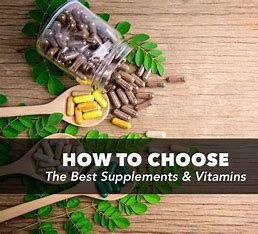Choosing the best supplements for your health needs can be a daunting task given the vast array of products available on the market. While supplements can provide support for your health and well-being, it’s important to approach them thoughtfully and strategically. Ideally, supplements should complement a balanced diet, not replace it.

1. Assess Your Health Goals and Needs
Before choosing a supplement, it’s essential to understand your specific health needs or goals. Are you looking to improve your immune system, boost energy levels, enhance skin health, or support bone health? Identifying your goals will help you narrow down which supplements are most appropriate for you.
- General Health: Multivitamins, omega-3 fatty acids, probiotics, and vitamin D.
- Immune Support: Vitamin C, zinc, elderberry, and echinacea.
- Bone Health: Calcium, vitamin D, magnesium.
- Energy and Vitality: B-vitamins, iron, magnesium.
- Digestive Health: Probiotics, digestive enzymes, fiber supplements.
- Joint Health: Glucosamine, chondroitin, turmeric (curcumin).
- Skin and Hair Health: Collagen, biotin, vitamin E, zinc.
2. Consult with a Healthcare Professional
It’s always a good idea to consult a doctor or a registered dietitian before starting any new supplement regimen, especially if you have any underlying health conditions, are pregnant or breastfeeding, or are on medications. Some supplements can interact with medications or may not be appropriate for certain medical conditions.
- A healthcare provider can help identify deficiencies through blood tests or evaluate your overall health needs.
- They can also provide guidance on dosage and avoid unnecessary supplementation.
3. Look for High-Quality, Reputable Brands
The quality of supplements can vary widely, so it’s crucial to choose trusted, reputable brands. Here’s how to assess quality:
- Third-Party Testing: Choose supplements that are tested by third parties (such as USP, NSF International, or ConsumerLab). These certifications ensure the product contains what it claims and is free from harmful contaminants.
- Transparency: Look for brands that provide clear ingredient lists and dosages. Avoid brands that use vague terms like “proprietary blends” that don’t specify the exact amounts of ingredients.
- No Fillers or Unnecessary Additives: Quality supplements should be free from unnecessary fillers, artificial colors, or excessive binders.
4. Understand Your Dosage Requirements
Supplement dosage is crucial for effectiveness and safety. Too little of a nutrient may not be helpful, and too much can be harmful.
- Follow Recommended Dosages: Always follow the recommended dosage on the label, unless advised otherwise by a healthcare professional.
- Avoid Mega-Doses: Large doses of certain vitamins or minerals can be toxic or cause side effects. For example, excessive vitamin A can lead to toxicity, while too much iron can cause gastrointestinal issues.
5. Consider Your Diet and Lifestyle
Before choosing supplements, take stock of your daily diet and lifestyle. If you’re already consuming certain nutrients in adequate amounts through food, you may not need additional supplementation.
- For example:
- If you eat a balanced diet with a variety of fruits, vegetables, lean proteins, and healthy fats, you may not need a multivitamin.
- If you follow a vegan or vegetarian diet, you might need to supplement with vitamin B12, iron, or omega-3s.
- If you’re an older adult, you may need additional calcium, vitamin D, or magnesium for bone health.
Tip: Supplements should fill nutritional gaps, not replace a healthy diet. Focus on nutrient-dense foods first and consider supplements when there are specific deficiencies or gaps.
6. Choose Supplements That Are Bioavailable
Bioavailability refers to how well and how quickly the body can absorb and use the nutrients in a supplement. Some forms of nutrients are more easily absorbed than others. Here are a few things to consider:
- Minerals: Magnesium citrate is typically better absorbed than magnesium oxide.
- Vitamin D: Vitamin D3 (cholecalciferol) is more effective than D2 (ergocalciferol).
- Omega-3s: Fish oil and krill oil are good sources of bioavailable omega-3s, but plant-based omega-3s (ALA) from flaxseed may have lower bioavailability.
7. Be Mindful of Potential Interactions and Side Effects
Certain supplements can interact with medications, either enhancing or reducing their effects. Always be aware of any potential interactions, and discuss these with a healthcare provider before adding supplements to your routine.
- For example:
- Vitamin K can interfere with blood thinners like warfarin.
- Calcium and magnesium can interfere with the absorption of certain medications.
- St. John’s Wort may interact with antidepressants and birth control pills.
Additionally, some supplements may cause side effects like nausea, headaches, or digestive issues. Start with lower doses and increase gradually if needed.
8. Look for Natural or Plant-Based Supplements
Natural, plant-based supplements can offer a more bioavailable and gentle alternative to synthetic supplements, and they may come with added benefits like antioxidants and other nutrients.
- Examples:
- Ashwagandha for stress reduction and adrenal support.
- Turmeric (curcumin) for anti-inflammatory benefits.
- Ginger for digestive support.
- Moringa for a nutrient boost.
When choosing plant-based supplements, make sure they are sustainably sourced and free from harmful additives or pesticides.
9. Check for Potential Allergens
If you have any allergies or sensitivities, always check the label for potential allergens. Common allergens include dairy, gluten, soy, and nuts, which are sometimes used in the production or formulation of supplements.
- Gluten-Free: If you have celiac disease or a gluten sensitivity, look for certified gluten-free supplements.
- Vegan-Friendly: Some supplements may contain animal-derived ingredients like gelatin or fish-derived omega-3s. If you’re vegan or vegetarian, choose plant-based or vegan-certified supplements.
10. Evaluate Price vs. Quality
While supplements can vary widely in price, the cheapest option isn’t always the best, and expensive options don’t always guarantee quality. Compare products based on ingredient quality, bioavailability, and brand reputation rather than just cost.
- Don’t assume that higher-priced supplements are automatically more effective. Focus on the quality of the ingredients and their effectiveness in meeting your health needs.
11. Be Patient and Monitor Your Progress
Supplements often take time to show effects, so it’s essential to be patient and give them a few weeks or months to see if they’re working for you.
- Track Your Symptoms: Keep a journal of any changes in your energy levels, mood, sleep quality, or overall well-being to track the effectiveness of the supplements.
- Evaluate and Adjust: After a few months, assess whether the supplement is delivering the desired results. If not, consult with your healthcare provider to make adjustments.
Conclusion:
Choosing the best supplements for your health requires careful consideration of your individual needs, diet, lifestyle, and health goals. Start by consulting a healthcare professional, then select high-quality, bioavailable supplements that align with your nutritional gaps or health objectives. By doing your research, being mindful of potential interactions, and choosing the right products, you can make informed decisions that support your long-term health and well-being.
